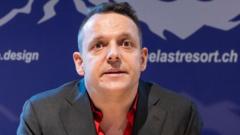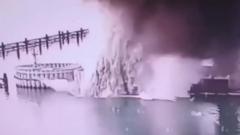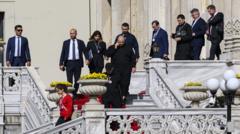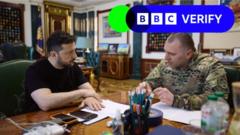General Carsten Breuer highlighted concerns over Russia's military buildup, including the production of tanks and artillery, as he calls for NATO unification and enhanced defense capabilities ahead of a significant NATO summit.
German Defense Chief Warns of Potential Russian Threat to NATO
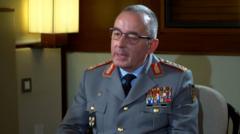
German Defense Chief Warns of Potential Russian Threat to NATO
The head of Germany's armed forces warns that Russia may pose a serious threat to NATO member states within the next four years, urging preparations against possible aggression.
Germany's chief of defense, General Carsten Breuer, has expressed grave concerns regarding a potential Russian attack on NATO within the next four years. Speaking at the Shangri-la Dialogue defense summit in Singapore, Breuer emphasized the need for NATO countries to prepare for the possibility of aggression from Russia, which he deemed a "very serious threat." During his address to the BBC, he pointed out that Russia is currently manufacturing hundreds of tanks annually—approximately 1,500 main battle tanks—which could be deployed against NATO's Baltic state members by 2029 or potentially sooner.
Despite some differences among NATO members, specifically Hungary and Slovakia, Breuer reassured that the alliance remains united in its support for Ukraine and the broader goal of collective defense. He underscored the urgent need for NATO to reassess its defense posture, particularly as the upcoming summit in The Hague will tackle crucial subjects such as defense budgets.
General Breuer illustrated the scale of Russia's military preparations, revealing plans for substantial artillery munitions production. He stated that while not all of this military output is directed toward Ukraine, it demonstrates a buildup of resources aimed at a future confrontation with NATO. The chief warned that analysts are predicting an escalation by 2029, but he cautioned that actions could come even earlier. "We must be able to fight tonight," he said, highlighting a pressing need for readiness.
Breuer pointed to the Suwalki Gap, a strategically critical area bordered by Lithuania, Poland, Russia, and Belarus, as particularly vulnerable to Russian influence. He noted a significant difference in perception of the threat across Europe, with Baltic States expressing heightened urgency compared to countries like Germany, where concerns feel more distant.
The general commented on various recent aggressive acts attributed to Moscow, including attacks on undersea cables and cyber incursions targeting public transport. He argues that NATO members need to ramp up their military capabilities to promote deterrence.
Refuting concerns over NATO cohesion, given Hungary and Slovakia's ties with Russia, Breuer stressed that unity among NATO members has strengthened, citing Finland and Sweden's application to join the alliance following the invasion of Ukraine. He asserted that NATO nations share a developing consensus on the necessity for robust collective defense measures.
Significantly, Breuer's statement reflects a shift in attitudes within Germany toward military spending and defense readiness. Longstanding reductions in military investment are being reconsidered, with even the typically pacifist Green Party supporting increased defense expenditures. As military leaders project readiness, however, the concern remains whether resources and capabilities will match the scale of Russia's military production ahead of a potential standoff, especially with the U.S. also reducing its troop presence in Europe to focus on challenges in the Indo-Pacific.







